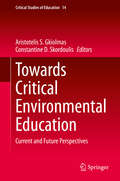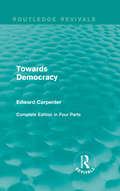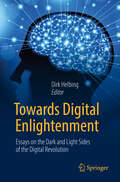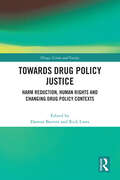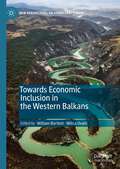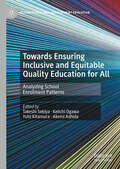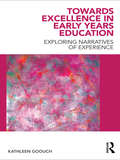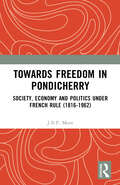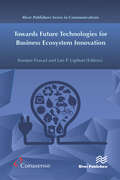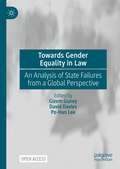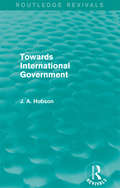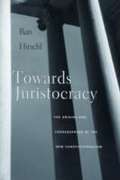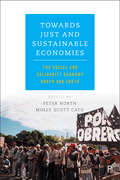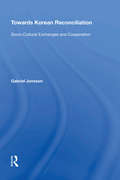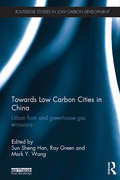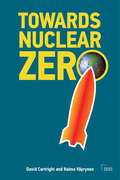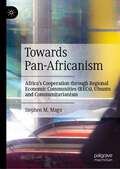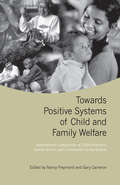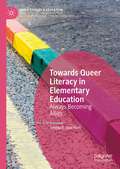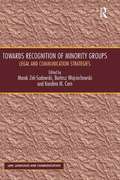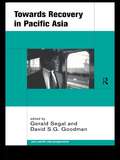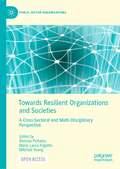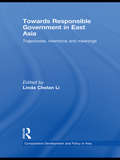- Table View
- List View
Towards Continental Environmental Policy?: North American Transnational Networks and Governance (SUNY series in Environmental Governance: Local-Regional-Global Interactions)
by Owen Temby and Peter StoettWhat are the most important transnational governance arrangements for environmental policy in North America? Has their proliferation facilitated a transition towards integrated continental environmental policy, and if so, to what degree is this integration irreversible? These governance arrangements are diverse and evolving, consisting of binational and trinational organizations created decades ago by treaties and groups of stakeholders—with varying degrees of formalization—who work together to address issues that no single country can alone. Together they provide leadership in numerous areas of environmental concern, including invasive species, energy efficiency, water, and terrestrial and aquatic wildlife. This book explores these arrangements, examining features such as stakeholder inclusion, organizational activities and functions, and issue comprehensiveness. Overall, the contributors report an underdeveloped policy architecture consisting of fragmented regional transnational networks of stakeholders and underfunded binational and trinational organizations. They also show evidence of substantial policy entrepreneurship and a vibrant informal underbelly to North American environmental governance, which will be vital in the challenging days ahead.
Towards Cosmopolis: Planning For Multicultural Cities
by Leonie SandercockFrom Polis to Metropolis, men and women have continued to struggle to perfect our cities. Urban history presents a picture of grand ideals and devastating failures. Towards Cosmopolis explores why we have failed, and how we could succeed, in building an urban Utopia - with a difference. Globalization, civil society, feminism and post-colonialism are the forces, ever shifting and changing our cities. We need a new vision to face such change. Sandercock pulls down the pillars of modernist city planning and raises in their place a new post-modern planning, a planning sensitive to community, environment and cultural diversity.
Towards Critical Environmental Education: Current and Future Perspectives (Critical Studies of Education #14)
by Aristotelis S. Gkiolmas Constantine D. SkordoulisThis volume discusses theory, philosophy, praxis and methods in Environmental and Ecological education, and considers the junction with the main visions and issues of Critical Pedagogy. The volume and its separate chapters address four axes, which can also be seen as the guidelines of the content as well as the central objectives of the book.The first axis concerns the missing theoretical and practical pieces at this point in time. The volume considers the issues that are not included in contemporary Environmental Education, and thus, deprive it from critical orientations. This implies that in Environmental Education, very little discussion exists about the political, economic, racial, gender and class issues that in most cases govern the actions of leaders and stake-holders. The second axis concerns what has been done so far and in what directions. This involves descriptions of theoretical approaches or actual applied methodologies in the classroom, such as curricula or syllabus used or the kind of actions certain educators have taken to infuse the issues of justice and critical reflection within the Environmental Education teaching agenda. The third axis examines proposals. It looks at ways to enrich domains of Environmental Education with the argumentations of Critical Pedagogy. The fourth axis concerns the way in which proposals can be effectuated. This part contains specific methodologies and teaching sequences, depicting ways of including major aspects of Critical Pedagogy and Critical Education in Environmental Education. Examples are: Non-anthropocentric ecological approaches in the classroom, political activism in the Curricula, mixture of field activities and political activities.
Towards Democracy (Routledge Revivals: The Collected Works of Edward Carpenter)
by Edward CarpenterEdward Carpenter’s Towards Democracy is well-known as a starting point of his later work. Originally written in 1881 whilst taking a break from lecturing in Universities across the UK, this four-volume poem dwells mainly on themes of freedom and equality; values that Carpenter wrote upon many times in his career. Originally published in 1883, this version in 1917, this title will be of interest to students of Sociology and English Literature.
Towards Digital Enlightenment: Essays on the Dark and Light Sides of the Digital Revolution
by Dirk HelbingThis new collection of essays follows in the footsteps of the successful volume Thinking Ahead - Essays on Big Data, Digital Revolution, and Participatory Market Society, published at a time when our societies were on a path to technological totalitarianism, as exemplified by mass surveillance reported by Edward Snowden and others. Meanwhile the threats have diversified and tech companies have gathered enough data to create detailed profiles about almost everyone living in the modern world - profiles that can predict our behavior better than our friends, families, or even partners. This is not only used to manipulate peoples’ opinions and voting behaviors, but more generally to influence consumer behavior at all levels. It is becoming increasingly clear that we are rapidly heading towards a cybernetic society, in which algorithms and social bots aim to control both the societal dynamics and individual behaviors. However there are also silver linings: most of the threats that have accumulated over the past years have been identified and regulations are on the way to being introduced. Furthermore, entirely novel approaches based on blockchain technology and other developments derived from complexity science offer the possibility of entirely redefining collective trust and building platforms to support our core societal values.
Towards Drug Policy Justice: Harm Reduction, Human Rights and Changing Drug Policy Contexts (Drugs, Crime and Society)
by Rick Lines Barrett, Edited by DamonTaking the shifting global drug policy terrain as a starting point, this collection moves beyond debates about whether to reform drug policies to a focus on delivering ‘drug policy justice’ – repairing the damage caused by the war on drugs as a component of reform efforts and safeguarding against future harms in legal markets. This book brings together some of the leading international thinkers and advocates on harm reduction and drug policy to introduce key questions in contemporary drug policy. Across five themes, and with contributions from different regions and disciplines, it explores ethical, legal, empirical and historical perspectives on delivering ‘drug policy justice’ from supply through to use. Essays cover a wide range of issues, from the effects of COVID on drug policy to securing economic and environmental justice, and from human rights in Asian drug policy to questions of race and equity in cannabis reforms, providing diverse insights on both prominent and overlooked drug policy challenges. Towards Drug Policy Justice is a benchmark text for scholars, students, advocates and policymakers as the book explores new models of global drug policy reform.
Towards Economic Inclusion in the Western Balkans (New Perspectives on South-East Europe)
by William Bartlett Milica UvalićThe countries in the Western Balkans have been severely affected by the wars and conflicts that led to the breakup of former Yugoslavia, by political instability and the effort of creating new states, weak economies and high levels of unemployment, poverty and social exclusion, and inequality. As revealed by recent surveys, such as EBRD’s Life in Transition Survey and Eurofound’s European Quality of Life Survey, life satisfaction in the region is far below that elsewhere in Europe. In recent years they had achieved a strong impetus of economic growth with falling rates of unemployment and increasing optimism for the future. However, the COVID-19 pandemic of 2020 has brought about a sudden reversal of these trends and a renewed deterioration in the economic outlook, and an increase in social hardships that heralds a repeat of past failures in economic inclusion policies. This book identifies the key challenges in the areas of economic inclusion, focusing on the themes of labour markets, vocational education and skills, female entrepreneurship and the integration of migrants. It considers the opportunities for solutions to “build back better” once the recovery from the COVID-19 crisis begins, and offers proposals for more acceptable, equitable and effective economic inclusion policies.
Towards Ensuring Inclusive and Equitable Quality Education for All: Analyzing School Enrolment Patterns (International and Development Education)
by Yuto Kitamura Keiichi Ogawa Takeshi Sekiya Akemi AshidaThis edited volume builds upon a rich literature base on quality, equity, and education for all. It focuses on enrolment patterns in education and includes extensive, micro-level analytical data to support their findings. The chapters include evidence-based analytical methods with three global regions and eleven country case studies that contribute to the United Nation’s Sustainable Development Goal 4 (SDG 4) Quality Education for All by 2030. The book offers valuable and practical learning materials for policymakers, field practitioners, researchers and research students specializing in comparative education, international educational development, and international cooperation.
Towards Excellence in Early Years Education: Exploring narratives of experience
by Kathleen GoouchThis book uniquely describes the work of two Early Years Professionals, drawing on their narrative accounts as they robustly describe and analyse their work with young children. Against a backcloth of increasing regulation and inspection of early years care and education, Kathy Gooch emphasizes the importance of building authentic relationships with children and their families, explores how play can be promoted as the central site for learning, and shows how professionals can use play to account for children’s development and learning. In analysing the Early Year Professionals’ narratives, this book explores key themes including: Traditional notions of ‘teaching’ and how they can be redefined The significance of talk in children’s lives Teachers’ professional identities How children’s potential in learning can be achieved through play Celebrating knowledge, skills and understanding and re-defining what it means to be a teacher, in its broadest sense, this fascinating book brings together research and literature from across disciplines. Containing a foreword by Tricia David, it will be of interest to academics, early years educators and students on early childhood education degree programmes and initial teacher education courses, as well as others concerned with the over prescriptive nature of early education.
Towards Freedom in Pondicherry: Society, Economy and Politics under French Rule (1816-1962)
by J.B.P. MorePondicherry had its own history due to its connection with the French. After delving deeply into social, cultural, economic aspects of the Pondicherry society, the study focuses on politics and the freedom movement as it developed there, using sources written in Tamil, English and French. But when the freedom movement gathered steam in British India, Pondicherry and its dependencies were caught between the ideas of joining the French Union, or the Indian Union. Goubert’s Socialist Party’s strategy had always been to safeguard French India’s special identity and interests. He and his party associates and supporters turned against the French offer to hold a referendum on the question of independence and decided to join the Indian Union, because Jawaharlal Nehru provided him a better guarantee to safeguard French Indian and Pondicherry interests. It was rather a very well planned move that took all his political adversaries including the French by surprise. Goubert actually won his battle without bloodshed, by accepting to bear a certain dishonor for that among the French. The French government finally chose to set aside the constitutional provisions of Article 27 of the French Constitution, which stipulated that no cession, or exchange or addition to the territories was valid without the consent of the concerned population. Thus, they disregarded the population of French India deliberately and scuttled out of French India. Earlier, they had given away the loges to India even without consulting the parliament or the people concerned, but now they threw overboard the French constitutional provision to disengage themselves from India permanently, after obtaining some weak guarantees for their cultural presence.
Towards Future Technologies for Business Ecosystem Innovation
by Ramjee Prasad Leo P. LigthartTowards Future Technologies for Business Ecosystem Innovation describes CONASENSE within the broad platform of the CTIF Global Capsule (CGC) covering future technologies and its enablers, smart cities, telemedicine, crowd computing, satellite, unmanned air vehicles , cooperative wireless sensor network, remotely piloted aircraft system, network neutrality as well as virtual business model
Towards Gender Equality in Law: An Analysis of State Failures from a Global Perspective
by David Davies Gizem Guney Po-Han LeeThis Open Access book aims to find out how and why states in various regions and of diverse cultural backgrounds fail in their gender equality laws and policies. In doing this, the book maps out states’ failures in their legal systems and unpacks the clashes between different levels and forms of law—namely domestic laws, local regulations, or the implementation of international law, individually or in combination. By taking off from the confirmation that the concept of law that is to be used in achieving gender equality is a multidimensional, multi-layered, and to an extent, contradictory phenomenon, this book aims to find out how different layers of laws interact and how they impact gender equality. Further to that, by including different states and jurisdictions into its analysis, this book unravels whether there are any similarities/patterns in how these states define and utilise policies and laws that harm gender equality. In this way, the book contributes to the efforts to devise holistic and universal policies to address various forms of gender inequalities across the world. This volume will be of interest to scholars and students in Gender Studies, Sociology, Law, and Criminology.
Towards International Government (Routledge Revivals)
by J.A. HobsonFirst published in 1915, Towards International Government considers the consequences of war for global diplomacy and the alliance system. Hobson argues that, to reduce armaments and the possibility of another world war, an organisational structure of international government must be put into place. An extension of the League of Nations, Hobson proposes that this council would need to hold legislative powers enabling it to impose economic sanctions and, if necessary, the ability to deploy an international force. This is a fascinating and exceptionally forward-thinking work, of great importance to economic and political historians of the twentieth century.
Towards Juristocracy: The Origins and Consequences of the New Constitutionalism
by Ran HirschlIn countries and supranational entities around the globe, constitutional reform has transferred an unprecedented amount of power from representative institutions to judiciaries. The constitutionalization of rights and the establishment of judicial review are widely believed to have benevolent and progressive origins, and significant redistributive, power-diffusing consequences. Ran Hirschl challenges this conventional wisdom. Drawing upon a comprehensive comparative inquiry into the political origins and legal consequences of the recent constitutional revolutions in Canada, Israel, New Zealand, and South Africa, Hirschl shows that the trend toward constitutionalization is hardly driven by politicians' genuine commitment to democracy, social justice, or universal rights. Rather, it is best understood as the product of a strategic interplay among hegemonic yet threatened political elites, influential economic stakeholders, and judicial leaders. This self-interested coalition of legal innovators determines the timing, extent, and nature of constitutional reforms. Hirschl demonstrates that whereas judicial empowerment through constitutionalization has a limited impact on advancing progressive notions of distributive justice, it has a transformative effect on political discourse. The global trend toward juristocracy, Hirschl argues, is part of a broader process whereby political and economic elites, while they profess support for democracy and sustained development, attempt to insulate policymaking from the vicissitudes of democratic politics.
Towards Just and Sustainable Economies: The Social and Solidarity Economy North and South
by Peter North and Molly Scott CatoWith capitalism in crisis - rising inequality, unsustainable resource depletion and climate change all demanding a new economic model - the Social and Solidarity Economy (SSE) has been suggested as an alternative. What can contribute in terms of generating livelihoods that provide a dignified life, meeting of social needs and building of sustainable futures? What can activists in both the global North and South learn from each other? In this volume academics from a range of disciplines and from a number of European and Latin American countries come together to question what it means to have a 'sustainable society' and to ask what role these alternative economies can play in developing convivial, humane and resilient societies, raising some challenging questions for policy-makers and citizens alike.
Towards Korean Reconciliation: Socio-Cultural Exchanges and Cooperation
by Gabriel JonssonDespite historic summits and spectacular acts of reconciliation between the rival neighbours, promises of improved cross-border relations between North and South Korea have been slow to materialize. In this insightful book, Gabriel Jonsson examines the impact that increased levels of socio-cultural contact has had on inter-Korean relations, the concrete results that have been achieved and how such contact has contributed to closer relations and offers the prospect of reconciliation. With reference to lessons from the German and Yemeni unification, the book examines the development of inter-Korean relations and presents a fascinating view of South Korean perceptions of their neighbours. The book also details the wider political sphere of influence with an analysis of the positions of the United States, Japan, China and Russia on Korean unity. Based primarily on Korean language sources, this volume provides completely unique perspectives on Korean unity.
Towards Low Carbon Cities in China: Urban Form and Greenhouse Gas Emissions (Routledge Studies in Low Carbon Development)
by Sun Sheng Han Ray Green Mark Y. WangThis book explores the relationship between urban form and greenhouse gas emissions in China, providing new insights for policy, urban planning and management. Drawing on the results of a four-year multidisciplinary research project, the book examines how factors such as urban households’ access to services and jobs, land use mixes and provision of public transport impact on greenhouse gas emissions. The authors analyse data from a wide range of sources including 4677 sample households from four major Chinese cities – Beijing, Shanghai, Wuhan and Xi’an – with diverse locations, urban spatial structures and population sizes. The book explores residents’ attitudes to reducing GHG emissions and advances knowledge relating to three environmental scales – cross-metropolitan, intra-city and neighbourhood level. It also contributes to debates on low carbon policy by revealing the relevance of urban planning parameters at both the macro and micro levels. The book will be of interest to scholars in the areas of urban planning, urban management, environmental sustainability and resource utilisation, as well as urban policy makers and planners who are working toward developing low carbon, sustainable cities of the future.
Towards Nuclear Zero (Adelphi series)
by David Cortright Raimo VäyrynenRarely in the atomic age have hopes been raised as high as they are now for genuine progress toward disarmament. The new receptivity reflected in the policy declarations of many governments was sparked by a wave of private initiatives led by former senior policy leaders in many countries. This book examines practical steps for achieving progress toward disarmament, realistically assessing both challenges and opportunities associated with achieving a world without nuclear weapons. The book places the current debate over nuclear abolition in the context of urgent non-proliferation priorities and the need to prevent nuclear weapons from falling into the hands of extremist regimes and terrorists. It examines the reasons why more than two dozen states have given up nuclear programs over the years and distils lessons from the end of the cold war to offer policy recommendations for moving toward lessened global reliance on nuclear weapons. Also included are in-depth analyses of proliferation challenges and disarmament opportunities in North Korea and Iran. The book concludes with a detailed roadmap for moving progressively toward global nuclear zero. It proposes a new international security regime based on shared missile defences, nonweaponized deterrence and greater efforts to enhance transnational cooperation.
Towards Pan-Africanism: Africa’s Cooperation through Regional Economic Communities (RECs), Ubuntu and Communitarianism
by Stephen M. MaguThis book traces the development and impact of regional economic communities (RECs) in Africa and addresses a timely question: do REC members, and the REC itself, positively influence member states’ behaviors towards other members and more broadly, regionally and continentally due to REC membership? ‘Changing member states’ behaviors’ is measured across three ‘interconnected, fundamental dimensions of societal-systems’ proposed by Marshall and Elzinga Marshall in CSP’s Global Repot 2017. These are i) the persistence of conflict or its counterpoint, achieving peace, ii) fostering democratization and better governance, and iii) achieving socio-economic development and (as proposed by this research, a fourth dimension), iv) being active participants in multilateralism? Is membership in a REC ultimately beneficial to the member and other countries in the region? While there are no clear and obvious – at least, discernible traditional – benefits such as increase in trade (perhaps because Africa’s overall trade relative to the world is about 3 percent), there are other non trade benefits (e.g., decrease in conflict, coercion to take certain actions towards peace and refrain from others, coups and wars) presenting in REC member states. These in/actions, abilities, coercions, exclusions and cooperation instances are outlined and discussed in the book.
Towards Positive Systems of Child and Family Welfare: International Comparisons of Child Protection, Family Service, and Community Caring Systems
by Gary Cameron Nancy FreymondThe need for services that respond to the ‘maltreatment’ of children and to the struggles of families is at the core of social service systems in all developed nations. While these child and family welfare systems confront similar problems and incorporate common elements, there are substantial differences in philosophy, organization, and operation across international settings and models.In this new collection of essays, Nancy Freymond and Gary Cameron have brought together some of the finest international minds to provide an original and integrated discussion of child protection, family service, and community caring models of child and family welfare. The volume not only examines child protection and family service approaches within Western nations – including Canada, the United States, England, the Netherlands, France, and Sweden – it is also the first comparative study to give equal attention to Aboriginal community caring models in Canada and New Zealand.The comparisons made by the essays in this volume allow for a consideration of constructive and feasible innovations in child and family welfare and contribute to an enriched debate around each system. This book will be of great benefit to the field for many years to come.
Towards Queer Literacy in Elementary Education: Always Becoming Allies (Queer Studies and Education)
by Selena E. Van HornThis book blends multiple research studies, historical and current events, reflective teaching examples, and guidance for LGBTQ+ inclusion and queer pedagogy in elementary schools. It is divided into three sections to guide the readers from a broad understanding of the hxstories of LGBTQ+ discriminations, rights, and some communities’ resistance to LGBTQ+ children, teachers, and curriculum to a focused invitation into the author's own reflections, teaching, and discussions with children about LGBTQ+ literature and topics. The volume provides hxstories, theoretical and methodological inquiry, resources, and encouragement for teacher-researchers ready to engage LGBTQ+-inclusion and queer literacy pedagogy in their classrooms, schools, and communities.
Towards Recognition of Minority Groups: Legal and Communication Strategies (Law, Language and Communication)
by Marek Zirk-Sadowski Bartosz WojciechowskiThis volume analyses current debates concerning problems in the nature, justification, and legal protection of human rights for minorities, with reference to the issues surrounding social milieu as a source of any legitimized law, which is in itself in need of legal recognition as well as being an object of legal protection. With contributions from a global network of scientists across several continents, the work examines the debate dedicated to the understanding of the normative framework, expressed in terms of human rights that guarantee autonomous action in public and private for minority groups as well as individuals. The chapters go on to study the particular claims that need to be audible and visible for others in the public sphere with reference to the legal protection of human rights. The work concludes with the completion of an interpretative circle debating the issues of legal consensus and legal identity with respect to the specificity of the patterns and modes guiding human interactions. Going beyond the legal analysis to discuss communication strategies in human rights, this collection will be of great interest to those studying the philosophy and theory of law, practical philosophy in general, political sciences and theory of democracy.
Towards Recovery in Pacific Asia (Esrc Pacific Asia Programme Ser.)
by David S. G. Goodman Gerald SegalAttempts to define the Asian Crisis and its future course continue to be hotly contested. Towards Recovery in Pacific Asia deals with financial and industrial reform, defence policies, the 'Asian-Values' debate, corruption and croneyism; as well as China, Japan and intra-regional affairs. Rather than trying to resolve the heated debate about the causes of the crisis, this book reflects on underlying trends to examine the possible paths of recovery. Bringing together experts in the field, Towards Recovery in Pacific Asia suggests that recovery is by no means impossible nor as difficult as might at first have seemed. But it requires political reform, tackling specific economic problems and the international support of the US, European Union and World Bank. There are still causes for concern, such as Indonesia's transition from the Suharto era and political reform in China and, most significantly, Japan. With its highly topical focus on the social, political and economic development of the Asia Pacific region, this book represents a vital, up-to-date analysis for students and researchers in Asian studies, International Relations, International Political Economy, as well as policy makers and professionals working in, or with, Pacific Asia.
Towards Resilient Organizations and Societies: A Cross-Sectoral and Multi-Disciplinary Perspective (Public Sector Organizations)
by Rómulo Pinheiro Maria Laura Frigotto Mitchell YoungThis open access book brings together scholars in the fields of management, public policy, regional studies, and organization theory around the concept of resilience. The aim is to provide a more holistic understanding of the complex phenomenon of resilience from a multi-sectorial, cross-national, and multidisciplinary perspective. The book facilitates a conversation across diverse disciplinary specializations and empirical domains. The authors contribute both to theory testing and theory development and provide key empirical insights useful for societies, organizations, and individuals experiencing disruptive pressures, not least in the context of a post-COVID-19 world. Diverse chapters are held together by a clear organization of the volume across levels of analysis (resilience in organizations and societies) and by an original perspective on resilience derived from an extended review, by the editors, of the existing literature and knowledge gaps, according to which each of the individual chapter contributions is positioned and connected to.
Towards Responsible Government in East Asia: Trajectories, Intentions and Meanings (Comparative Development and Policy in Asia)
by Linda Chelan LiThis book explores the idea of responsible government in East Asia, arguing that many recent governance crises have resulted from responsibility failures on a huge scale. It distinguishes between accountability, which it argues has been overemphasised recently, and responsibility, which it argues goes beyond accountability, true responsible government involving the actor in feeling liable for and taking responsibility for his or her actions. It shows how historically the concept of responsibility is more embedded in political discussions in Asia, whereas the concepts of democracy and accountability are more embedded in the intellectual traditions of Europe, but that the challenges of revolution and post-revolution, decolonization and post-colonization and neo-liberal globalization have complicated matters. Drawing on a wide range of case studies from East Asia, and relating the concepts discussed to political theory, ethics and social psychology, the book shows how actors in government and society interact to deliberate, produce or distract from the practice and perception of “responsible government”, and suggests how the concept of “responsible government”, better defined, might be encouraged to produce better governance.


